2024 Berkeley Haas Year in Review
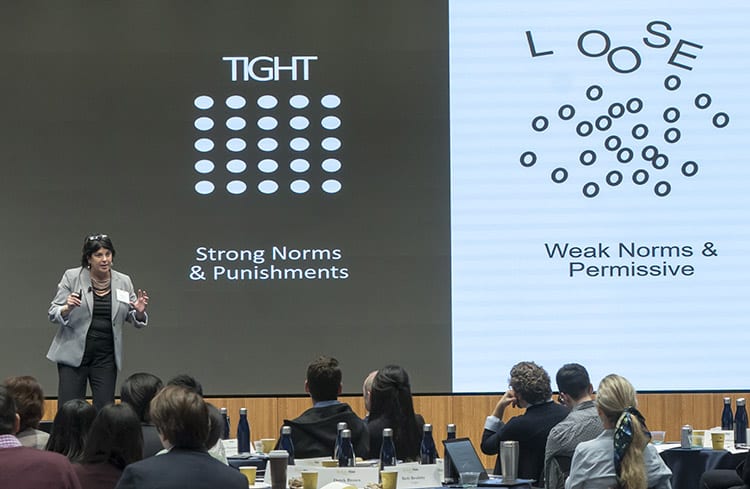
Michele Gelfand, a University of Maryland psychology professor, presents on her work examining “tight” vs “loose” cultures at the inaugural Berkeley Haas Culture Conference.
More than 100 senior business leaders and top scholars from around the world gathered at the Haas School last week to kick off the Berkeley Haas Culture Initiative, which will explore the role of culture and its impact in and across organizations.
The inaugural event was a two-day conference that brought together executives from Facebook, Netflix, Zappos, Pixar Animation Studios, Deloitte, Maersk, and other “culture-aware” companies with academics from a wide range of disciplines, including economics, anthropology, sociology, and psychology.
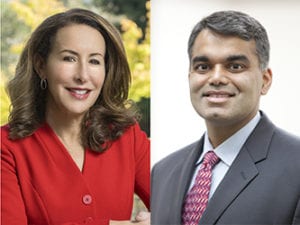
Jennifer Chatman and Sameer Srivastava
The initiative is the brainchild of Prof. Jennifer Chatman and Assoc. Prof. Sameer Srivastava of the Haas Management of Organizations Group, who aim to build a community of researchers and practitioners interested in how culture affects everything from hiring to promoting to the bottom line of corporate performance and strategic success.
“We invited a set of organizations that are already devoted to thinking about culture and asked them to explain the problems they are having on the ground, and we invited top academics to offer up a set of approaches to studying culture,” said Chatman. “What we are interested in is developing a shared research agenda to address some of the challenges we haven’t yet been able to solve.”
Launching the Berkeley Haas Culture Initiative
The Berkeley Haas Culture Conference was the first in what Chatman and Srivastava say will be an ongoing series of events, interdisciplinary research collaborations and industry partnerships, as well as communication exchanges on best practices. The idea was to start by taking stock of a field that has become increasing fragmented as it has expanded, Srivastava said.
“Economists study culture, psychologists study culture, and sociologists study culture—all in different ways,” Srivastava said. “At the same time, companies are developing innovative practices related to culture, and it’s often hard to disentangle what works and what doesn’t. We wanted to bring everyone together to start a conversation.”
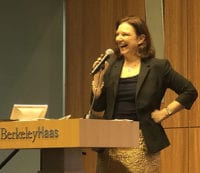
Berkeley Haas Dean Ann Harrison
Haas Dean Ann Harrison welcomed conference attendees by highlighting the school’s commitment to its own distinctive culture.
“You don’t have to be here very long to realize that we at Haas believe that our culture is what really sets us apart,” she said. “If we ask our students why they chose to come here, most say ‘We came here because of the culture.’ And they all refer to our Defining Leadership Principles.”
UC Berkeley at the center of organizational culture research
Attendees noted that UC Berkeley has long been a leader in the study of organizational culture. “It’s really appropriate to have a conference like this here at Berkeley,” said Michael Morris, a cross-cultural psychologist and professor of management at Columbia University. Much of the classic work on organizational culture and cultural sociology came out of the university, he said.
Chatman and Charles O’Reilly, a Haas professor emeritus now at the Stanford Graduate School of Business, are pioneers in the field (both are Haas PhD alumni). Influential work has also come out of Berkeley’s anthropology, sociology, and psychology departments. More than two dozen Berkeley faculty members—including a dozen from Haas—were among those in attendance at the conference.
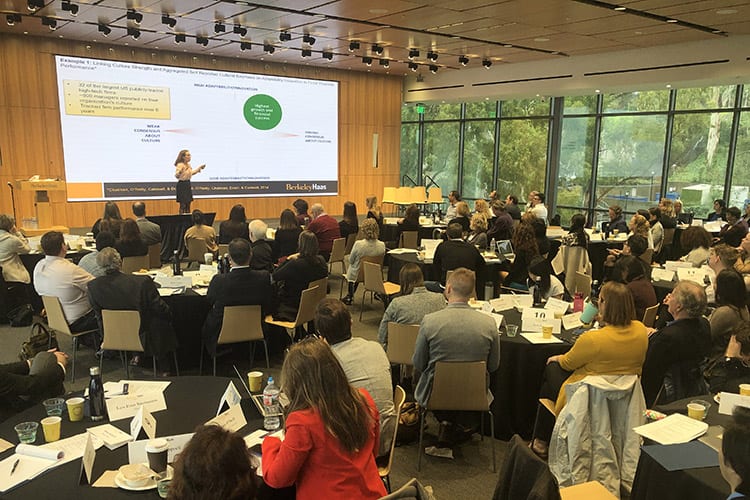
Prof. Chatman presented on how to measure culture.
New data, new methods
Over two days, more than 100 invited attendees tackled a breadth of issues around organizational culture. Academics described their latest research with an emphasis on how data and new research methods, such as using computational approaches and unobtrusive culture measures of culture, are opening up opportunities for companies to better understand how their overall culture—and subcultures within departments or teams—affect their organizations.
For example, researchers are analyzing words used in employee emails for signs of cultural fit among individuals. They can use apps to unobtrusively capture group conversations or obtain video from body cameras. They’re also looking at historical data, such as folklore in pre-industrial countries, to better understand modern social norms. Social media platforms such as Glassdoor, too, have become a rich source of data.
“What is amazing about the papers presented here—and what is very different from 20 years ago—is the quality of the research, the use of lab and field studies, the use of archival data and ethnographies, and the use of sophisticated measurement techniques,” O’Reilly said.
Challenges on the ground
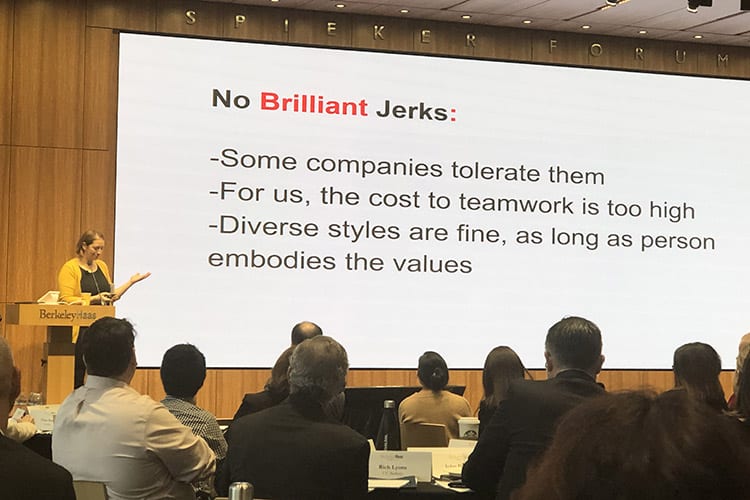
Bethany Brodsky of Netflix discussed the company’s distinctive culture.
For their part, company speakers spoke candidly about the challenges around culture they are confronting as their businesses evolve, whether through mass hiring, mergers, new business strategies, or changes in leadership.
“Every time we add employees or a group of employees, our culture shifts,” said Inyong Kim, the vice president of employee experience at Adobe, who described how and why the company abolished formal performance reviews in favor of the “ongoing check-in.”
Ever-changing cultures was a theme echoed by others. For Deloitte, the question of how to transition a 150-year-old company for the future meant embracing “courage” as a key cultural value and embedding the attribute throughout the firm, said Jen Steinmann, Deloitte’s chief transformation officer. “Our three tenets of culture are the need to speak openly, support one another, and act boldly,” she said.
Bethany Brodsky, VP of talent for Netflix, talked about the enormous challenges that came with the company’s massive hiring spree after it launched simultaneously in more than 130 countries three years ago.
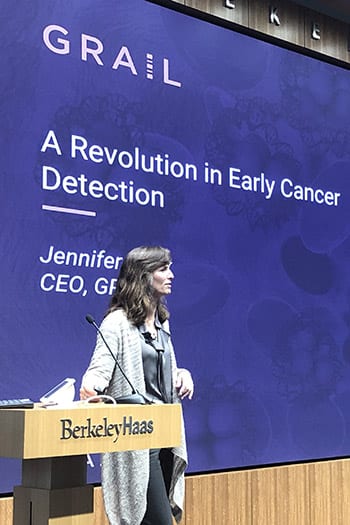
Grail CEO Jennifer Cook
“When you have all these new people, how do you transmit [your] culture?” asked Brodsky. A word like “feedback,” she noted, doesn’t always translate. “It Russian, it translates closest to ‘criticism,’” she said.
Jennifer Cook, MBA 98 and the CEO of cancer detection startup Grail, said her experiences at six companies of varying sizes over 15 years have taught her that culture is a key leadership tool. “What I’ve realized in looking back is that there were any number of organizational themes and challenges that I had faced, and our teams had faced, for which culture was the relevant solution,” she said.
Seeds of a shared agenda
Bob Gibbons, a professor of organizational economics at MIT’s Sloan School of Management, said he is pleased that the culture initiative’s goals match his own agenda of nudging his field in an applied direction. In his case, that means addressing the question of “How can an economist help a fixed set of people collaborate better together?”
“People in the world know that culture is a thing and that it matters, and they are looking to us for help,” he said. “There’s an enormous academic opportunity, and it’s super important to do it across a whole bunch of disciplines that are represented in this room. I loved hearing that part.”
Founding sponsors of the Berkeley Haas Culture Initiative include Goldman Sachs, Adobe, Deloitte, Maersk, Spencer Stuart, and the UC Investments Office.
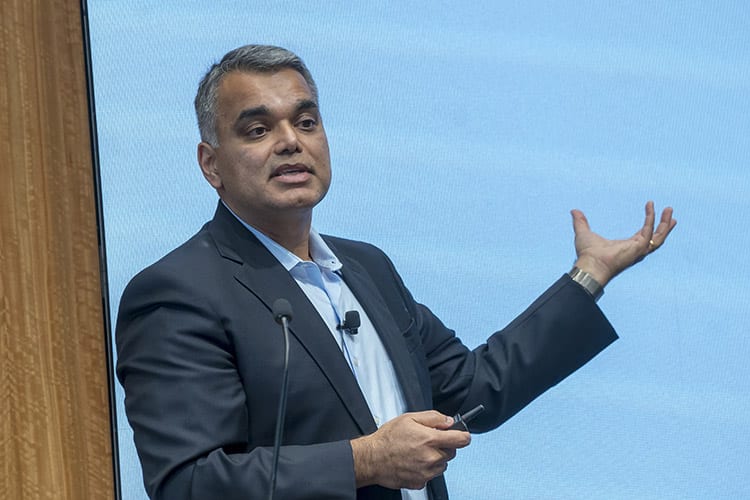
Assoc. Prof. Sameer Srivastava
Posted in:



